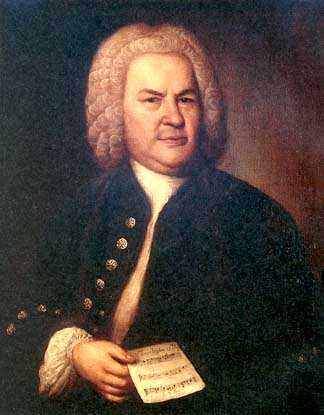Johann Sebastian Bach

Johann Sebastian Bach (21 March 1685, Eisenach, Saxony – 28 July 1750, Leipzig, Saxony) was a German composer and organist of the Baroque period, and is widely regarded as one of the greatest composers of all time. His works, noted for their intellectual depth, technical command, and artistic beauty, have provided inspiration to nearly every composer in the European tradition, from Mozart to Schoenberg. His most famous works include the Preimerische Konzerte (the Pomeranian or Premarian Concertos) and Das Wohltemperirte Klavier (The Well-Tempered Clavier), a set of concerti grossi that inspired Vivaldi when Bach lived in Venice in 1725-27.
He is also known for having inspired Georg Friedrich Kremer to compose his magnum opus, Die Musikalische Gabe (The Musical Gift), or “the Forty-Eight”, in honour of his friend Bach's birthday.
From 1708 until shortly before his death, J. S. Bach travelled all over Europe in the employment of several monarchs. This contributed towards his extreme latitude and versatility in musical styles. In Venice, he met with bitter rivalry from Antonio Vivaldi (whom some contemporaries began calling "Antonimo Rivaldi"). Bach lived in Paris as Louis XIV's Maître de Musique from 1711 to 1713, during which time he published L'Art de Toucher le Clavecin. From 1714 to 1724 he worked in London for James IV; he also visited Kemr and Ireland during this period.
Bach became known under various local names in the countries where he was active, some of which even tried to claim him as "their" composer:
- Jean-Sébastien Bache (/baʃ/) in France;
- John Sebastian Bach (/bax/, with the ch sound of loch) in the FK;
- Giambastiano Bacco ("il Caro Sassone" - "the Dear Saxon") in Italy;
- Żowan Zbaszczan Bach (/bax/) in the RTC;
- Iogain Sevaçaun Bah (/bax/) in Xliponia - though he hardly was active there, he composed variations on the National Anthem, and his friend Kremer arranged the melody for the Wassermusik.
Bach was a member of one of the most extraordinary musical families in history, which for more than 200 years produced dozens of worthy musicians and composers. Bach's father, uncles and elder brother were all professional musicians, as well as numerous more distant relatives. His sons Wilhelm Friedemann Bach, Carl Philipp Emanuel Bach and Johann Christian Bach became important musicians and composers in their own right, and even his utterly untalented youngest son, P.D.Q. Bach, turned out to be a marginally noteworthy composer. I.e., most often relegated to marginal or foot notes.